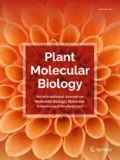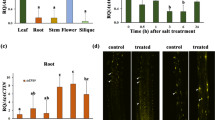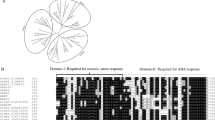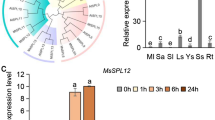Abstract
Temperature-induced lipocalins (TIL) are plasmalemma-localized proteins and responsive to environmental stresses. Physiological functions of MfTIL1 from Medicago sativa subsp. falcata (L.) Arcang. (hereafter falcata), a forage legume with cold and drought tolerance, were investigated in this study. MfTIL1 expression was greatly induced by 4–96 h of cold treatment, while transcript levels of the orthologs in Medicago truncatula, a model legume plant with lower cold tolerance than falcata, were reduced or not altered within 48–96 h. MfTIL1 expression was not responsive to dehydration and salinity. Compared to the wild type, transgenic tobacco plants overexpressing MfTIL1 had lower temperature (LT50) that resulted in 50 % lethal and elevated survival rate in response to freezing, elevated F v/F m and decreased ion leakage after treatments with chilling, high light and methyl viologen (MV). H2O2 and O2 − were less accumulated in transgenic plants than in the wild type after treatments with chilling, high light and MV, while antioxidant enzyme activities showed no difference between the two types of plants prior to or following treatments. Higher transcript levels of NtDREB3 and NtDREB4 genes were observed in transgenic plants than in the wild type under non-stressed conditions, but higher transcript levels of NtDREB1, NtDREB2, NtDREB4 and NtCOR15a genes under chilling conditions. It is suggested that MfTIL1 plays an important role in plant tolerance to cold and oxidative stress through promoted scavenging of reactive oxygen species and up-regulating expression of multiple cold responsive genes.








Similar content being viewed by others
References
Baker SS, Wilhelm KS, Thomashow MF (1994) The 5′-region of Arabidopsis thaliana cor15a has cis-acting elements that confer cold-, drought- and ABA regulated gene expression. Plant Mol Biol 24:701–713
Bradford MM (1976) A rapid and sensitive method for the quantification of microgram quantities of proteins utilizing the principle of protein–dye binding. Ana Biochem 72:248–254
Brinker M, Brosche M, Vinocur B, Abo-Ogiala A, Fayyaz P, Janz D, Ottow EA, Cullmann AD, Saborowski J, Kangasjärvi J, Altman A, Polle A (2010) Linking the salt transcriptome with physiological responses of a salt-resistant Populus speciesas a strategy to identify genes important for stress acclimation. Plant Physiol 154:1697–1709
Charron FJB, Breton G, Badawi M, Sarhan F (2002) Molecular and structural analyses of a novel temperature stress-induced lipocalin from wheat and Arabidopsis. FEBS Lett 517:129–132
Charron JBF, Ouellet F, Pelletier M, Danyluk J, Chauve C, Sarhan F (2005) Identification, expression, and evolutionary analyses of plant lipocalins. Plant Physiol 139:2017–2028
Charron JBF, Ouellet F, Houde M, Sarhan F (2008) The plant apolipoprotein D ortholog protects Arabidopsis against oxidative stress. BMC Plant Biol 8:86
Chi W-T, Fung RM, Liu H-C, Hsu C-C, Charng Y-Y (2009) Temperature-induced lipocalin is required for basal and acquired thermotolerance in Arabidopsis. Plant Cell Environ 32:917–927
Fowler S, Thomashow MF (2002) Arabidopsis transcriptome profiling indicates that multiple regulatory pathways are activated during cold acclimation in addition to the CBF cold response pathway. Plant Cell 14:1675–1690
Foyer CH, Noctor G (2005) Oxidant and antioxidant signaling in plants: a re-evaluation of the concept of oxidative stress in a physiological context. Plant Cell Environ 28:1056–1071
Frova C (2003) The plant glutathione transferase gene family: genomic structure, functions, expression and evolution. Physiol Plant 119:469–479
Guo Z, Huang M, Lu S, Zhao Y, Zhong Q (2007) Differential response to paraquat induced oxidative stress in two rice cultivars on antioxidants and chlorophyll a fluorescence. Acta Physiol Plant 29:39–46
Guo Z, Tan J, Zhuo C, Wang C, Xiang B, Wang Z (2014) Abscisic acid, H2O2 and nitric oxide interactions mediated cold-induced S-adenosylmethionine synthetase in Medicago sativa subsp. falcata that confers cold tolerance through up-regulating polyamine oxidation. Plant Biotechnol J 12:601–612
Hara M, Terashima S, Fukaya T, Kuboi T (2003) Enhancement of cold tolerance and inhibition of lipid peroxidation by citrus dehydrin in transgenic tobacco. Planta 217:290–298
Jaglo KR, Kleff S, Amundsen KL, Zhang X, Haake V, Zhang JZ, Deits T, Thomashow MF (2001) Components of the Arabidopsis C-repeat/dehydration responsive element binding factor cold-response pathway are conserved in Brassica napus and other plant species. Plant Physiol 127:910–917
Kawamura Y, Uemura M (2003) Mass spectrometric approach for identifying putative plasma membrane proteins of Arabidopsis leaves associated with cold acclimation. Plant J 36:141–154
Keunen E, Peshev D, Vangronsveld J, Van den Ende W, Cuypers A (2013) Plant sugars are crucial players in the oxidative challenge during abiotic stress: extending the traditional concept. Plant Cell Environ 36:1242–1255
Krasensky J, Jonak C (2012) Drought, salt, and temperature stress-induced metabolic rearrangements and regulatory networks. J Exp Bot 63:1593–1608
Larkindale J, Knight MR (2002) Protection against heat stress-induced oxidative damage in Arabidopsis involves calcium, abscisic acid, ethylene, and salicylic acid. Plant Physiol 128:682–695
Maly FE, Nakamura M, Gauchat JF, Urwyler A, Walker G, Dahinden CA, Cross AR, Jones OTG, Weck AL (1989) Superoxide-dependent nitroblue tetrazolium reduction and expression of cytochrome b 245 components by human tonsillar lymphocytes and B cell lines. J Immunol 142:1260–1267
Medina J, Catalá R, Salinas J (2011) The CBFs: three Arabidopsis transcription factors to cold acclimate. Plant Sci 180:3–11
Miura K, Furumoto T (2013) Cold signaling and cold response in plants. Int J Mol Sci 14:5312–5337
Muffat J, Walker DW, Benzer S (2008) Human ApoD, an apolipoprotein up-regulated in neurodegenerative diseases, extends lifespan and increases stress resistance in Drosophila. Proc Natl Acad Sci USA 105:7088–7093
Nishizawa A, Yabuta Y, Shigeoka S (2008) Galactinol and raffinose constitute a novel function to protect plants from oxidative damage. Plant Physiol 147:1251–1263
Orozco-Cárdenas ML, Ryan C (1999) Hydrogen peroxide is generated systemically in plant leaves by wounding and systemin via the octadecanoid pathway. Proc Natl Acad Sci USA 96:6553–6557
Pang C, Wang C, Chen H, Guo Z, Li C (2009) Transcript profiling of cold responsive genes in Medicago falcata. In: Yamada T, Spangenberg G (eds) Molecular breeding of forage and turf. Springer, New York, pp 141–149
Pennycooke JC, Cheng H, Stockinger EJ (2008) Comparative genomic sequence and expression analyses of Medicago truncatula and alfalfa subspecies falcata COLD-ACCLIMATION-SPECIFIC genes. Plant Physiol 146:1242–1254
Peshev D, Vergauwen R, Moglia A, Hideg É, Van den Ende W (2013) Towards understanding vacuolar antioxidant mechanisms: a role for fructans? J Exp Bot 64:1025–1038
Rassart E, Bedirian A, Do Carmo S, Guinard O, Sirois J, Terrisse L, Milne R (2000) Apolipoprotein D. Biochim Biophys Acta 1482:185–198
Riday H, Brummer EC (2002) Forage yield heterosis in alfalfa. Crop Sci 42:716–723
Sambe MAN, He X, Tu Q, Guo Z (2014) A cold-induced myo-inositol transporter-like gene (MfINT-like) confers tolerance to multiple abiotic stresses in transgenic tobacco plants. Physiol Plant. doi:10.1111/ppl.12249
Sanchez D, Lopez-Arias B, Torroja L, Canal I, Wang X, Bastiani MJ, Ganfornina MD (2006) Loss of glial lazarillo, a homolog of apolipoprotein D, reduces lifespan and stress resistance in Drosophila. Curr Biol 16:680–686
Steponkus PL, Uemura M, Joseph RA, Gilmour SJ, Thomashow MF (1998) Mode of action of the COR15a gene on the freezing tolerance of Arabidopsis thaliana. Proc Natl Acad Sci USA 95:14570–14575
Tan J, Wang W, Xiang B, Han R, Guo Z (2013a) Hydrogen peroxide and nitric oxide mediated cold- and dehydration-induced myo-inositol phosphate synthase that confers multiple resistances to abiotic stresses. Plant Cell Environ 36:288–299
Tan J, Zhuo C, Guo Z (2013b) Nitric oxide mediates cold- and dehydration-induced expression of a novel MfHyPRP that confers tolerance to abiotic stress. Physiol Plant 149:310–320
Wan X, Tan J, Lu S, Lin C, Hu Y, Guo Z (2009) Increased tolerance to oxidative stress in transgenic tobacco expressing a wheat oxalate oxidase gene via induction of antioxidant enzymes is mediated by H2O2. Physiol Plant 136:30–44
Zeller G, Henz SR, Widmer CK, Sachsenberg T, Ratsch G, Weigel D, Laubinger S (2009) Stress-induced changes in the Arabidopsis thaliana transcriptome analyzed using whole-genome tiling arrays. Plant J 58:1068–1082
Zhang L, Zhao M, Qiu Y, Tian Q, Zhang W (2011) Comparative studies on tolerance of Medicago truncatula and Medicago falcata to freezing. Planta 234:445–457
Zhuo C, Cai J, Guo Z (2013a) Overexpression of early light-induced protein (ELIP) gene from Medicago sativa ssp. falcata increases tolerance to abiotic stresses. Agron J 105:1433–1440
Zhuo C, Wang T, Lu S, Zhao Y, Li X, Guo Z (2013b) A cold responsive galactinol synthase gene from Medicago falcata (MfGolS1) is induced by myo-inositol and confers multiple tolerances to abiotic stresses. Physiol Plant 149:67–78
Acknowledgments
This work was supported by the National Basic Research Program of China (2014CB138701) and the Natural Science Foundation of China (30830081).
Author information
Authors and Affiliations
Corresponding author
Additional information
Xueying He, Mame Abdou Nahr Sambe and Chunliu Zhuo have contributed equally to the work.
Electronic supplementary material
Below is the link to the electronic supplementary material.
Rights and permissions
About this article
Cite this article
He, X., Sambe, M.A.N., Zhuo, C. et al. A temperature induced lipocalin gene from Medicago falcata (MfTIL1) confers tolerance to cold and oxidative stress. Plant Mol Biol 87, 645–654 (2015). https://doi.org/10.1007/s11103-015-0304-3
Received:
Accepted:
Published:
Issue Date:
DOI: https://doi.org/10.1007/s11103-015-0304-3




